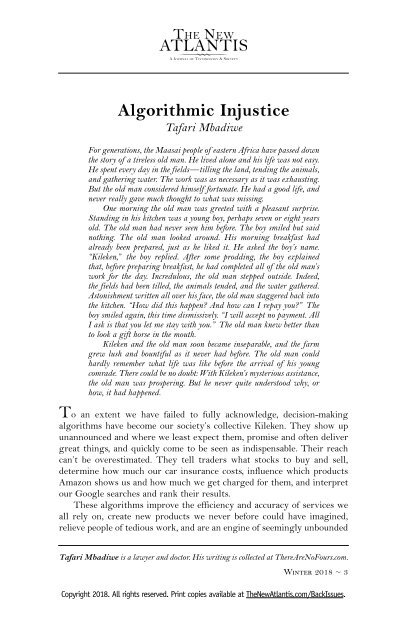The New Atlantis - Winter 2018 (Issue 54) uncompressed with cover
Create successful ePaper yourself
Turn your PDF publications into a flip-book with our unique Google optimized e-Paper software.
Algorithmic Injustice<br />
Tafari Mbadiwe<br />
For generations, the Maasai people of eastern Africa have passed down<br />
the story of a tireless old man. He lived alone and his life was not easy.<br />
He spent every day in the fields — tilling the land, tending the animals,<br />
and gathering water. <strong>The</strong> work was as necessary as it was exhausting.<br />
But the old man considered himself fortunate. He had a good life, and<br />
never really gave much thought to what was missing.<br />
One morning the old man was greeted <strong>with</strong> a pleasant surprise.<br />
Standing in his kitchen was a young boy, perhaps seven or eight years<br />
old. <strong>The</strong> old man had never seen him before. <strong>The</strong> boy smiled but said<br />
nothing. <strong>The</strong> old man looked around. His morning breakfast had<br />
already been prepared, just as he liked it. He asked the boy’s name.<br />
“Kileken,” the boy replied. After some prodding, the boy explained<br />
that, before preparing breakfast, he had completed all of the old man’s<br />
work for the day. Incredulous, the old man stepped outside. Indeed,<br />
the fields had been tilled, the animals tended, and the water gathered.<br />
Astonishment written all over his face, the old man staggered back into<br />
the kitchen. “How did this happen? And how can I repay you?” <strong>The</strong><br />
boy smiled again, this time dismissively. “I will accept no payment. All<br />
I ask is that you let me stay <strong>with</strong> you.” <strong>The</strong> old man knew better than<br />
to look a gift horse in the mouth.<br />
Kileken and the old man soon became inseparable, and the farm<br />
grew lush and bountiful as it never had before. <strong>The</strong> old man could<br />
hardly remember what life was like before the arrival of his young<br />
comrade. <strong>The</strong>re could be no doubt: With Kileken’s mysterious assistance,<br />
the old man was prospering. But he never quite understood why, or<br />
how, it had happened.<br />
To an extent we have failed to fully acknowledge, decision-making<br />
algorithms have become our society’s collective Kileken. <strong>The</strong>y show up<br />
unannounced and where we least expect them, promise and often deliver<br />
great things, and quickly come to be seen as indispensable. <strong>The</strong>ir reach<br />
can’t be overestimated. <strong>The</strong>y tell traders what stocks to buy and sell,<br />
determine how much our car insurance costs, influence which products<br />
Amazon shows us and how much we get charged for them, and interpret<br />
our Google searches and rank their results.<br />
<strong>The</strong>se algorithms improve the efficiency and accuracy of services we<br />
all rely on, create new products we never before could have imagined,<br />
relieve people of tedious work, and are an engine of seemingly unbounded<br />
Tafari Mbadiwe is a lawyer and doctor. His writing is collected at <strong>The</strong>reAreNoFours.com.<br />
<strong>Winter</strong> <strong>2018</strong> ~ 3<br />
Copyright <strong>2018</strong>. All rights reserved. Print copies available at <strong>The</strong><strong>New</strong><strong>Atlantis</strong>.com/Back<strong>Issue</strong>s.


